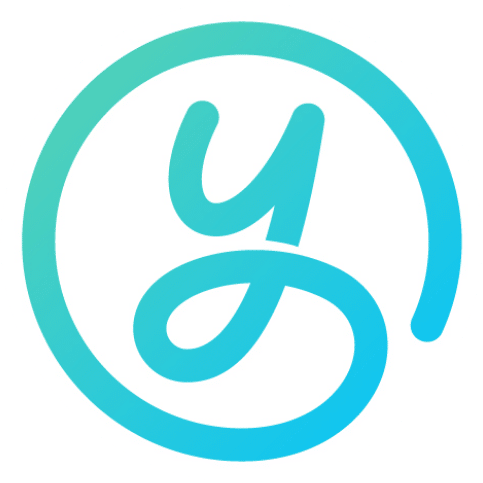If you’re applying to Queen’s University for the Bachelor of Health Sciences (BHSc), or you’re simply interested in learning more about the program, this guide is for you.
As a potential Queen’s BHSc applicant, you’re probably overwhelmed by the amount of information out there.
That’s why we created this guide.
Here, we’ll break down everything you need to know about Queen’s University Health Sciences, including the application, deadlines, acceptance rate, program info, common questions, and much more—all in one place.
REMEMBER: This guide primarily focuses on the on-campus Queen’s BHSc program. If you are applying for the online BHSc program, learn more about the application process and requirements here.
By the way, if you’re serious about getting into Queen’s Health Sciences, our 1-on-1 Youth Coaching services will help you become a stronger applicant, student, and leader. We work on things like improving real-world skills, building self-awareness, and achieving big goals, so you can maximize your post-secondary potential.
Don’t forget to check out our Queen’s Health Sciences App Prep Guide for a full breakdown of the Queen’s Health Sciences Supplementary Essays, including possible questions, examples, and more.
Table of Contents
- Admission Process: Application criteria; How to Apply; Admission requirements; Acceptance Rate; Admissions average; and More.
- Supplementary Essays: Essay overview; Essay evaluation; Possible Questions; Examples; and More.
- About the Program: Learning Approaches; Study Abroad (Queen’s BHSc in England); Ranking; Tuition; Courses; Day in the Life; and More.
- Common Questions: What are classes like?; How does Queen’s get students ready for med school?; What’s the difference between Health Sciences and Life Sciences?; and More.
- Program Comparisons: McMaster Health Sciences (BHSc)
Queens Health Sciences (BHSc) Requirements & Admission Process
We get a ton of questions from students asking about the application process and whether or not their grades, extracurriculars, and other activities will make them a competitive applicant.
In this section, we’ll go through exactly what you need to apply, including admission requirements and averages, application deadlines, and how to apply, so you can be confident that you have everything covered.
Queen’s Health Sciences – Application Criteria & How to Apply
There are 2 components of the Queen’s University Health Sciences application:
- Online Application: Submitted through the Ontario Universities’ Application Centre (OUAC) (101 Application for current Ontario high school students; 105 Application for Canadian or international students who are not currently enrolled at an Ontario high school).
The OUAC applications for the on-campus Bachelor of Health Sciences program opens on October 1, 2022 for starting the program in Fall 2023. Applications, changes, or additions to applications are due at OUAC for all first year programs by February 1, 2023.
REMEMBER: The OUAC application Queen’s Kingston on-campus code is QH. If you are applying for the Bader International Study Centre UK campus, use code QIH, and if you’re doing the program online the code is QHO.
- Supplementary Application: Complete 1 short Supplementary Essay (SE), with a maximum of 2,000 characters. The questions will be sent through SOLUS and will remain valid for 30 days. Keep reading a complete breakdown of how to ace your SEs.
Students can access the Supplementary Essay starting on November 1, 2022. The final day to submit the Supplementary Essay is February 15, 2023.
For more information on how (and when) to submit your online application and supplementary essays, visit this page.
Queen’s Health Sciences – Requirements
Here are the academic/course requirements for Canadian High Schools Students to the Queen’s Health Sciences program:
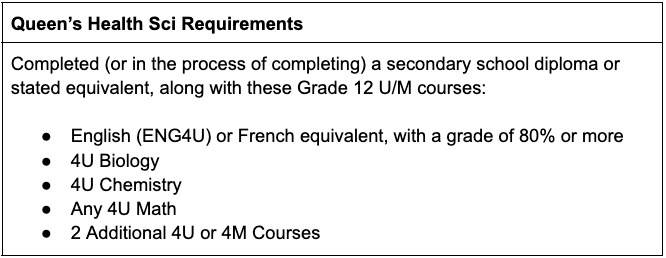
If you are an international student, learn more about the specific requirements to your location/curriculum using this Admissions Requirements tool.
If you’re a Canadian student, you can access province-specific requirements using this tool as well.
REMEMBER: In addition to completing these required courses, all students MUST complete the Supplementary Essay (SE). Keep reading to learn how to make yours stand out.
Queen’s Health Sciences – Admission Average
Queen’s BHSc states that applicants must have a minimum cumulative average cut off of 95% (including the prerequisite courses) to be considered for admission to the program.
Every applicant must also have a grade of 80% or higher in ENG4U.
This is where the Supplementary Essay is the difference maker.
If you can get a ‘Distinguished’ grade of each of the evaluation criteria, your app will be pushed into the competitive zone, even if your average is a little bit lower.
Not sure how to do this? Keep reading to learn how to write a standout Supp App, and check out our Queen’s Health Sciences App Prep Guide for everything you need to know.
You Might Also Like
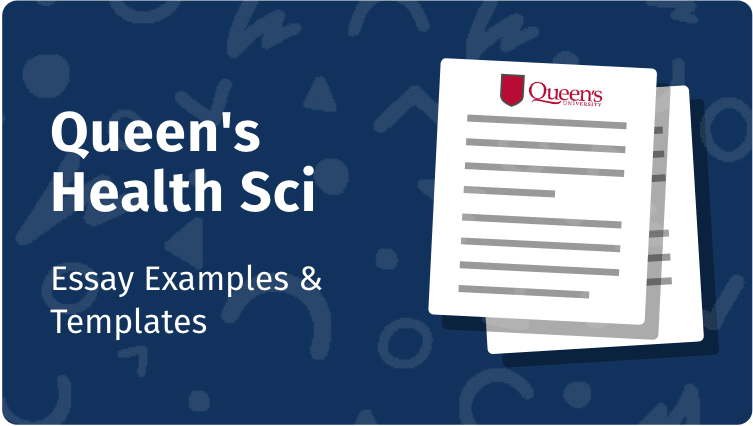
Application Prep
Queen’s Health Sciences: Supplementary Application Essay Examples & Templates 2023/2024
If you are looking for guidance on the Queen’s Health Sciences supplementary application, including application essay essay examples and templates,… Read more
Queen’s Health Sciences – Acceptance Rate
The number of applicants and the number of spots for Queen’s University Health Sciences has been pretty consistent for the last few years.
In 2023/2024, there are 205 spots for first years at Queen’s Health Sciences, and over 5,000 students applied. That means that the Queen’s Health Sciences acceptance rate is 4%.
Perhaps because of the COVID-19 pandemic or because of the rising prestige of the Queen’s Health Sciences program in general, there was an increase in applicants to around 5,600 for students starting the program in September 2021. This means that the new acceptance rate was around 3.04%, making this program more competitive and a bit tougher to get into.
Here’s a visual breakdown to help makes things easier to understand (actual data should be updated):
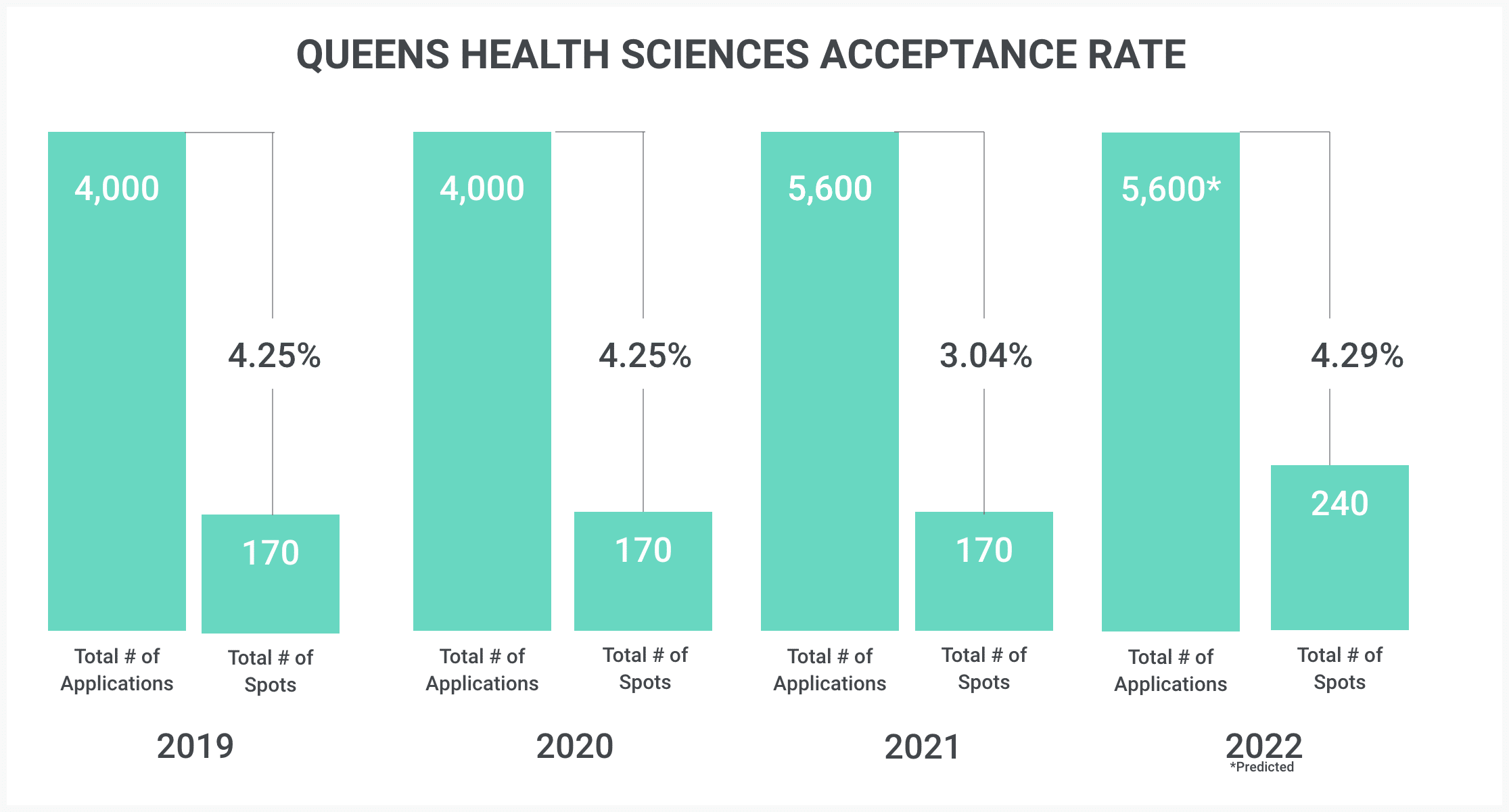
REMEMBER: Just because Queen’s BHSc receives thousands of applications every year, not all the applications are considered, either because they are incomplete or because they don’t meet the grade/course requirements. This means that the acceptance rate will be a bit higher than 4.29% in the end. Just focus on writing standout Supplementary Essays and your application will be competitive. Want to increase your chances of admission success? Connect with a coach to get started.
Queen’s Health Sciences – Deadlines
The online application for on-campus Bachelor of Health Sciences opens on October 1, 2022 for students starting in Fall 2023.
The deadline for the OUAC application is February 1, 2023.
You can access the Supplementary Essay starting on November 1, 2022, and the final day to submit the Supplementary Essay is February 15, 2023.
IMPORTANT: When you access your Supplementary Essay questions, you will have 30 DAYS to complete and submit your SE. If you don’t submit them before the 30-day deadline, you will be given NEW questions. However, if you access your questions on February 1, you must submit them on or before the February 15 cutoff, even though that’s less than 30 days.
For other important dates and deadlines, visit this page.
Queen’s Health Sciences – Acceptance Dates
After the February 15 Supplementary Essay deadline, the admissions committee will review applications from early March until May.
If you haven’t heard anything by this time, DON’T PANIC — Queen’s Health Sciences assesses applications until mid-May, and then the admissions decisions will be posted on SOLUS.
REMEMBER: If you want to accept your offer to Queen’s BHSc, you must do so by June 1.
Need help with this process? We got you.
get a youth coach™Joel
Queen’s Health
Sci Expert &
Youth Coach™

Queens Health Sciences – Supplementary Application 2022-2023
Queen’s Health Sci – Application Overview
The Supplementary Application is a mandatory component of your application to Queen’s Health Sciences.
As mentioned above, the Supplementary Essay (SE) questions are available on November 1, 2022 through SOLUS, which you can access once you’ve submitted your OUAC application.
You will be given 3 essay questions, and you must write an essay for 1 question.
There is a 2,000 character limit for EACH essay.
IMPORTANT: You have 30 days from when you access the questions on SOLUS to complete it. If you do not complete the first randomly generated set of questions by 30 days, another set of three questions will appear for your completion.
You cannot submit your essays past February 15, so even if you access the questions on, say February 14, you must submit before February 15 rather than the 30-day auto-renew deadline.
You can see how many days you have left to complete your essays on SOLUS (as shown in the image below).
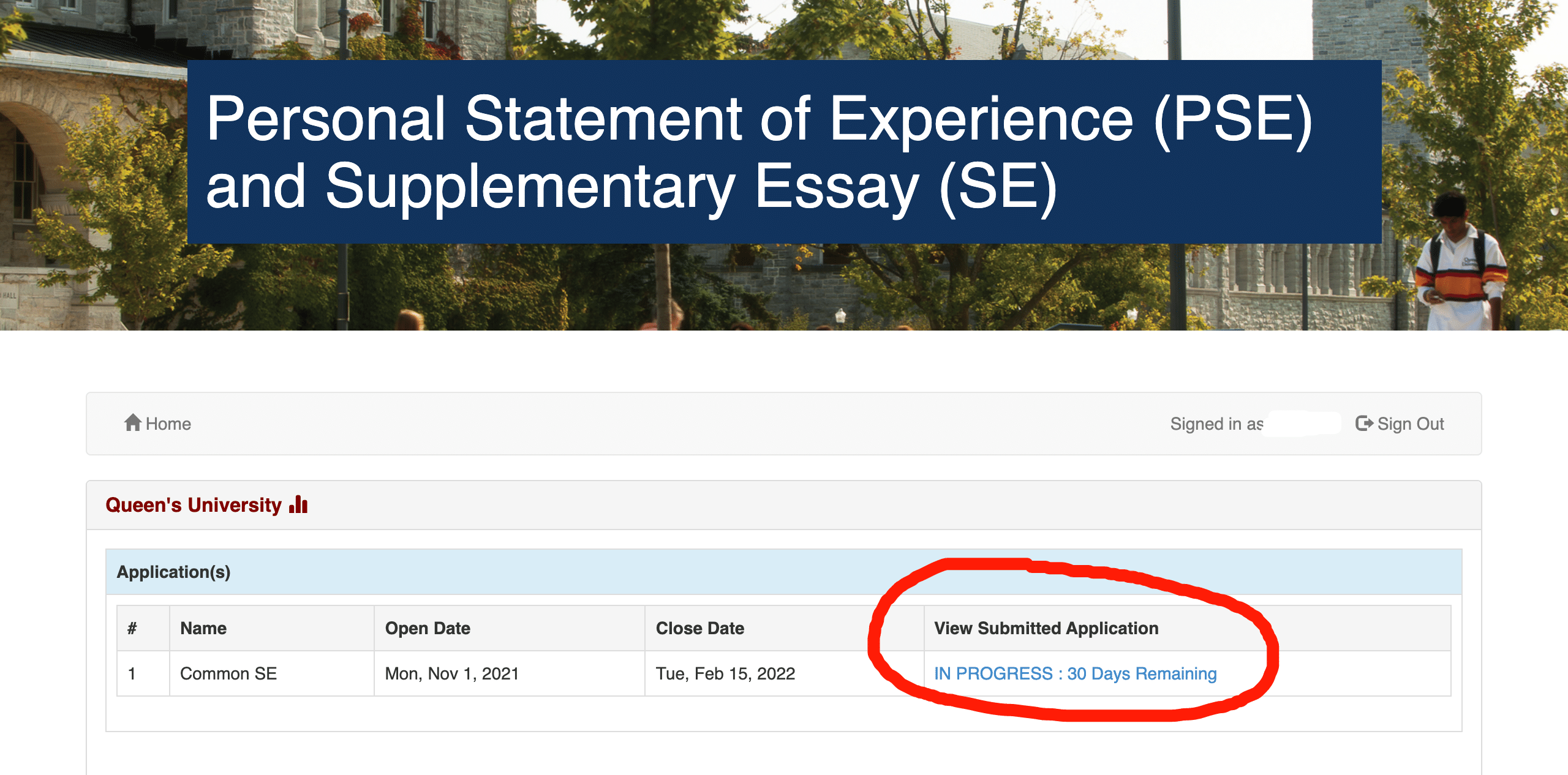
Queen’s Health Sciences: Supplementary Application – Evaluation
Unlike some schools which accept or reject applicants based only on grades, Queen’s Health Sciences assesses students beyond academic performance.
To help you know exactly what they’re looking for, they’ve released a Supplementary Essay Rubric with 3 main evaluation criteria, each of which has 4 possible scores:
- Positionality and Lived Experience: Positionality is the understanding of how your identity (e.g. race, socioeconomic, gender, sexuality, etc.) influences your biases in the world. Lived Experience is more commonly understood as ‘life experience’. Queen’s is looking for applicants who can connect their understanding of their position in life with significant experiences they’ve encountered.
- Connection: Connection appears to simply be defined as answering the question clearly and identifying a clear learning outcome within that answer.
- Personal Growth: Personal Growth is the demonstrated ability to understand one’s strengths and development areas, and then work to reach their full potential in all areas of their life.
Here’s what the essay evaluation rubric looks like:
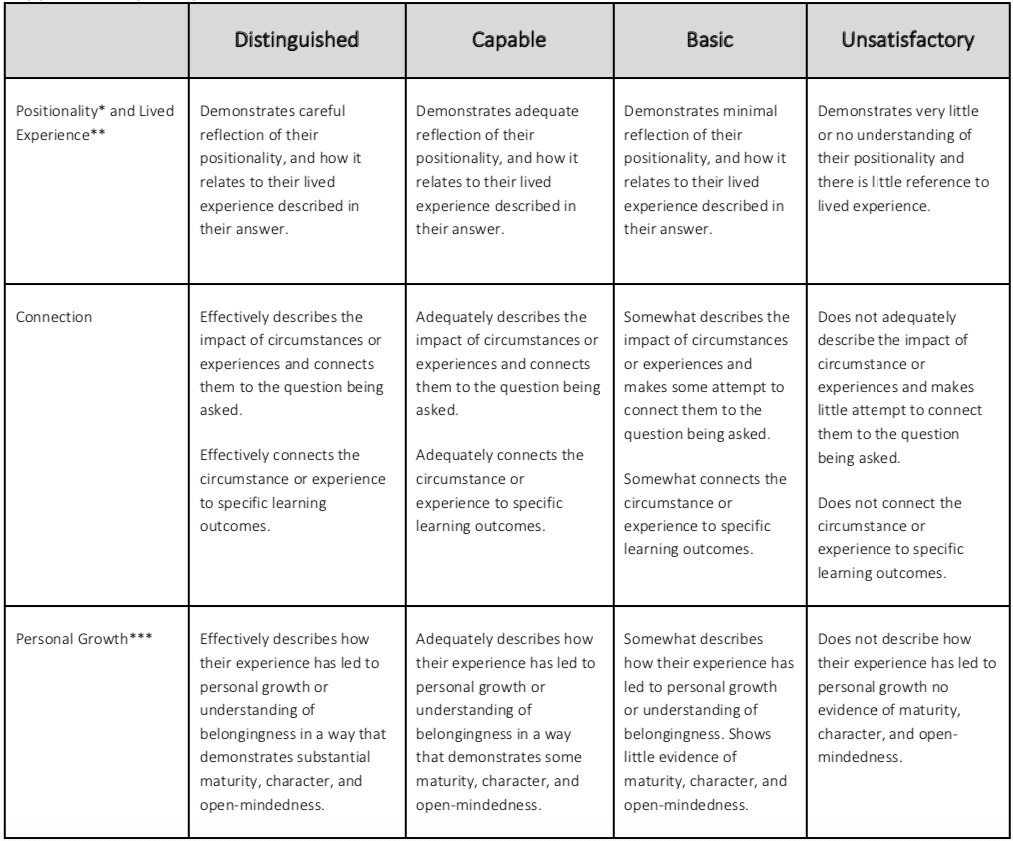
There is also a final evaluation area, ‘Communication Clarity’, rated either Satisfactory or Unsatisfactory.
Improving real-world skills like communication is an essential part of our ‘full student’ coaching methodology. To make sure you get a ‘Satisfactory’ on the Communication Clarity part of your evaluation, read our Narrative Communication Approach™ Guide and Deductive Communication Approach™ Guide.
Even if you have a really high admission average, if your Supplementary Essays aren’t unique and memorable, while showcasing your experiences, skills, interests, and goals, you could hurt your chances of getting in.
Put simply, the Supplementary Essay can mean the difference between acceptance and rejection.
We know that these essays can be really stressful and overwhelming, but don’t forget: you’re not alone! 🙂
If you want to learn how to get a ‘Distinguished’ score in all areas of this evaluation rubric and improve your chances of admission success, check out our Queen’s Health Sciences App Prep Guide and connect with a coach now to get started on your essays.
You Might Also Like
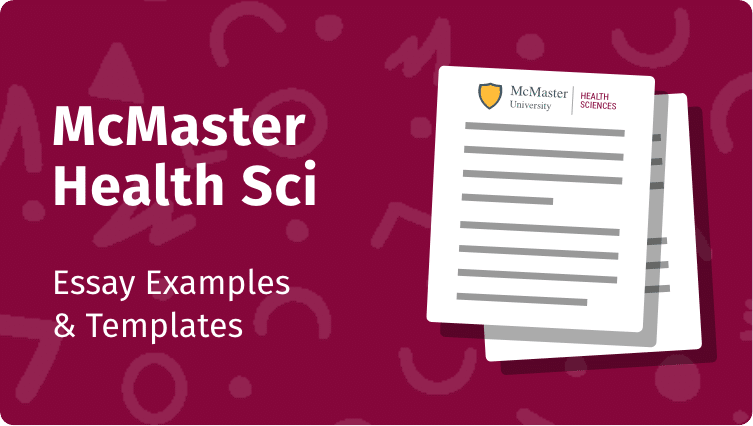
Application Prep
McMaster Health Sciences: Supplementary Application Essay Examples & Templates 2023/2024
If you are looking for guidance on the McMaster Health Sciences (BHSc) Supplementary Application, as well as essay examples and… Read more
Queen’s Health Sciences: Supplementary Application – Possible Questions
Here are some of the Queen’s BHSc Supplementary Essay questions we’ve seen come up.
You’ll see that there are typically two question types for the SE:
- Personal Questions: Focus on you, including things like your experiences, the people you know, your interests, etc.
- Moral Questions: Prompt you to discuss issues like diversity, inclusion, injustice, and equity, and discuss how your experiences, learnings, and identity influence your opinions, beliefs, and biases.
While the questions come out in a random batch of three questions from the above list, we notice applicants will almost always receive 1 Personal Question, 1 Moral Question, and 1 either Personal OR Moral Question.
While the questions come out in a random batch of 3 questions from the above list, we notice applicants will almost always receive 1 Personal Question, 1 Moral Question, and 1 either Personal OR Moral Question.
Here are some possible questions:
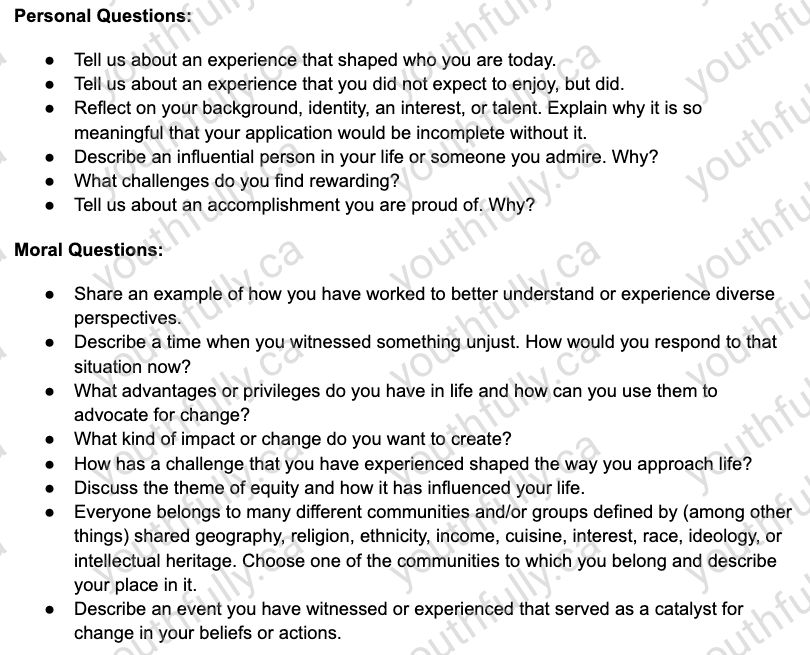
For a detailed breakdown on how to approach Personal Questions and Moral Questions, as well as Supplementary Essay examples, templates, prep tips, and more, read our Queen’s Health Sciences App Prep Guide. Trust us, you DO NOT want to miss this key resource.
Queen’s Health Sciences: Supplementary Application – Examples
Here’s an example Supplementary Essay for the Personal Question: “Tell us about an experience that shaped who you are today.”
REMEMBER: This is an EXAMPLE ONLY and is NOT meant for you to copy. Why? First and foremost, this is plagiarism and is a serious offense. Plagiarizing these essays will result in immediate disqualification from the admissions process. This can be easily detected using technology and application reviewers are usually trained and/or able to spot when an application isn’t original and does not align with an applicant’s background, personality, values, etc.
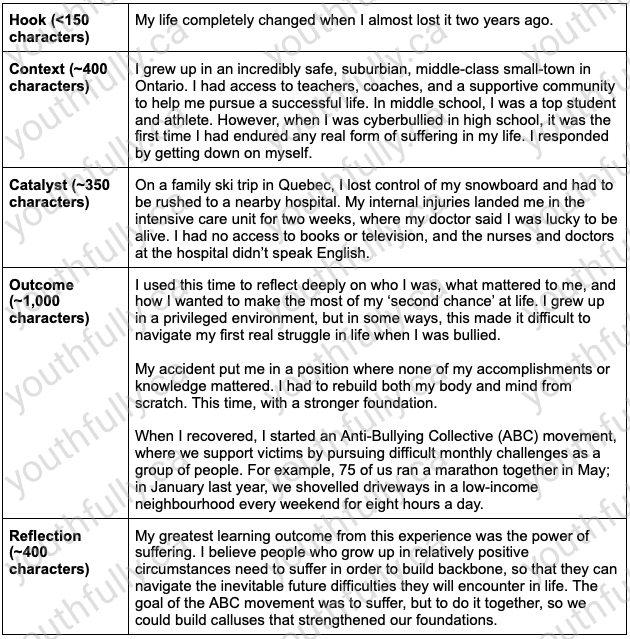
For more Supplementary Essay examples, read our Queen’s Health Sciences App Prep Guide and connect with a coach so you can see how to use your interests, skills, goals, and experiences in unique and authentic essays.
Ace your Queen’s Health Sci Supp App.
get a youth coach™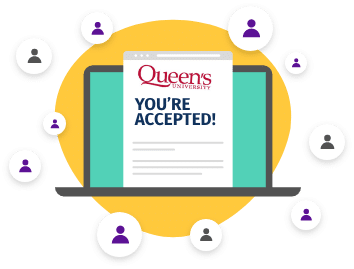
About the Queens Health Sci (BHSc) Program
The Bachelor of Health Sciences (BHSc) at Queen’s University is a 4-year, direct entry program that’s designed to teach students about how the body functions in health and disease, how it defends itself, and how medications are used to fight disease and infections.
Unlike some other undergraduate health programs, Queen’s Health Sciences emphasizes the importance of learning the societal context of health and healthcare through a global lens.
With a strong focus on research methods, in labs, simulations, and living labs, as well as interdisciplinary and flexible program options and a focus on building core competencies/skills, each student graduates with the skills and knowledge they need to excel in the healthcare industry.
In this section, we’ll go over some of the aspects of this program so you can get more information and make sure that it’s right for you. If you have any questions, connect with a coach for support.
Queen’s Health Sci – Learning Approach
The Queen’s Faculty of Health Sciences’ innovative approaches to learning makes this program one of the top ranked programs in Canada for BHSc.
The curriculum at Queen’s BHSc focuses on two areas:
QUEEN’S HEALTH SCI – FLIPPED CLASSROOM
The Queen’s BHSc eliminates the traditional lecture-style of learning and uses a teaching style called ‘flipped learning’ (for on-campus students).
In this approach, traditional learning of going to class and then doing homework/assignments after is reversed. Instead, students review online modules and complete the associated interactive learning activities and self-assessment quizzes for each module BEFORE the class starts. Then, in class they apply and discuss what they’ve learned already.
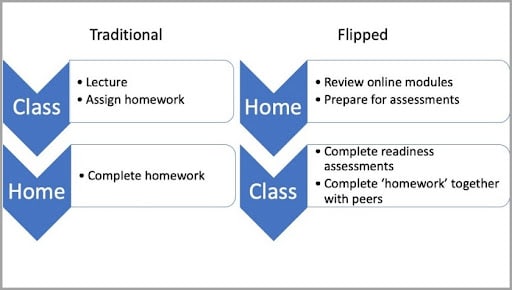
Students work with their peers in small groups, while a faculty member or teaching assistant mediates the discussion, working through important and difficult concepts using real-world examples, clinical case studies, and engaging discussions.
COACH’S TIP: If you want to be successful in this program, you MUST master your time management skills, learn to work independently, and constantly hold yourself accountable to complete the online modules before class. It will be a tough adjustment at first, but developing these skills will really pay off in the end (and we’re always here to support you if you need help developing these skills before the program starts!).
The flipped classroom is such an effective style of learning because once you do the online modules, you are reinforcing and reviewing what you’ve already learned, making it easier to remember and understand. These small group discussions are also really helpful if you have questions or if something isn’t clear.
Another great thing about the online modules is that it’s so flexible — do them at your own pace, in the evening, on the weekend, or whatever works for your schedule (just as long as it’s before the class they’re assigned for). If you are having a tough time with a particular topic, you can take it slower or even repeat it if you need the extra time with the material (vs. a teacher just speeding through the material in a lecture and you not fully understanding it).
To learn more about the learning style at Queen’s Health Sciences and Flipped Learning, visit this page.
QUEEN’s HEALTH SCI – COMPETENCIES FRAMEWORK
Students completing a Bachelor of Health Sciences develop key skills (or ‘competencies’) that align with the educational framework of professional schools.
Queen’s focuses on these 7 competencies derived from the CanMEDS framework, which identifies and describes abilities that physicians require to be effective healthcare providers:
- Collaborator: Work effectively with other health care professionals to provide safe, high-quality, patient-centered care.
- Communicator: Form relationships with patients and their families that facilitate the gathering and sharing of essential information for effective health care.
- Health Advocate: Contribute their expertise and influence as they work with communities or patient populations to improve health.
- Leader: Engage with others to contribute to a vision of a high-quality health care system and take responsibility for the delivery of excellent patient care through their activities as clinicians, administrators, scholars, or teachers.
- Scholar: Demonstrate a lifelong commitment to excellence in practice through continuous learning and by teaching others, evaluating evidence, and contributing to scholarship.
- Professional: Committed to the health and well-being of individual patients and society through ethical practice, high personal standards of behaviour, accountability to the profession and society, physician-led regulation, and maintenance of personal health.
- Content Expert: Interprets and connects health sciences information, developing a depth and breadth of knowledge of the health sciences.
All the courses and assessments in the Health Sciences program teaches students how to develop these competencies, giving them a significant advantage over other students, especially in the application process for healthcare professional schools.
It’s also a huge advantage because students entering a professional program are already equipped with these skills, rather than having to learn them when they enter the program, further giving them an advantage over other students.
For more information about Queen’s BHSc Learning Outcomes and the Competencies Framework, visit this page.
Queen’s Health Sciences – Learning Tracks
Queen’s BHSc offers 7 Learning Tracks, as well as the choice to combine in-class and online studies.
These Tracks allow students to explore their particular field of interest, while taking discipline-specific courses and doing in-depth research of these areas.
These Learning Tracks are completely optional and any student can enrol in whichever one they’re most interested in. Students can choose their Learning Track at the end of Year 1.
Here are the 7 Learning Track options:
- Anatomical Basis of Health and Disease
- Applied Research Methods in Health Sciences
- Global and Population Health
- Infection, Immunity, and Inflammation
- Molecular Basis of Biology
- Pharmacology, Toxicology, and Therapeutics
- Physiological Basis of Health and Disease
Students must complete the required courses for the particular track they’ve chosen, as well as an additional 4 courses (typically 12 units) from a specified list of BHSc option courses (and any prerequisite courses for those).
Once completed, the Learning Track will appear on your transcript.
Learn more about the Learning Track options as well as descriptions and requirements for each here.
Queen’s Health Sciences – Courses
Each Queen’s BHSc student is required to complete a specific number of core, option, and elective courses in each year of study.
In upper years, students can also take up to 6.0 units that are outside the program, called Personal Interest Credits (PICs). PICs are pass or fail and do not affect overall GPA. These credits are a great opportunity to explore other interests and get a well-rounded, interdisciplinary education.
Queen’s Health Sci First Year Courses (18 Units Required):
Here are the Queens Health Sci first year courses you’ll be required to take:
- ANAT 100: Anatomy of the Human Body
- GLPH 171: Social and Physical Determinants of Health and Disease
- HSCI 190: Introduction to Statistics for the Health Sciences (NOTE: If a student has previously completed BIOL 243 or STAM 200, they do not need to take HSCI 190 to fulfil the statistics requirement)
- IDIS 173: History and Philosophy of Health and Healthcare (previously BMED 173)
- PHAR 100: Introductory Pharmacology
- PHGY 170: Human Cell Physiology
- 6.0 option courses from this list
- 6.0 electives from this list
Did You Know?: When you take the Anatomy of the Human Body class, you’ll get to go to the Queen’s University Anatomy Learning Centre. This facility has hundreds of specimens, bones, and anatomical models, and you’ll have the chance to see real human cadavers and anatomical material. This is such a unique learning experience and will help you engage with the material beyond what’s simply written in a textbook.
Want to see what a real Queen’s Health Sciences course is like? Check out this course demo.
Year 2 Required Courses (18 Units Required):
- BCHM 270: Biochemical Basis of Health and Disease
- GLPH 271: Global and Population Health
- HSCI 270: Fundamentals of Health Research Methodology (previously BMED 270)
- PHGY 215: Principles of Mammalian Physiology I
- PHGY 216: Principles of Mammalian Physiology II
- 1 of MICR 270: Infection, Immunity, Inflammation OR MICR 271: Introduction to Microbiology
- 6.0 option courses from this list
- 6.0 electives from this list
Year 3 Required Courses (15.0 United Required):
- BCHM 370: Genetics and Genomics (previously BMED 370)
- IDIS 373: Health Ethics, Law, and Policy (previously BMED 373)
- PHAR 370: Fundamentals of Pharmacology and Therapeutics (previously PHAR 270)
- PATH 310: Introduction to Pathology and Molecular Medicine
- REPD 372: Reproduction and Development
- 9.0 option courses from this list
- 6.0 electives from this list
Year 4 Required Courses (6.0 Units Required):
- GLPH 471: Advanced Global and Population Health
- REPD 473: Developmental Origins of Health and Disease
- 18.0 option courses from these 3 lists
- 6.0 electives from this list
Click here for a full breakdown of the Queen’s BHSc curriculum, including degree progression, course descriptions, and more.
Queen’s BHSc also has a handy Program Map you can use to visualize your options and customize the program.
Queen’s Health Sciences – QuARMS
The Queen’s University Accelerated Route to Medical School (QuARMS) is a unique pathway that lets graduating Canadian high school students apply to Queen’s Medical School after 2 years of undergraduate study in the Health Sciences program, without taking the MCAT.
This pathway is one of a kind in Canada, and is exclusively for Black-identified and Indigenous students (see the full list of requirements here).
Learn more about the QuARMS program here.
You Might Also Like
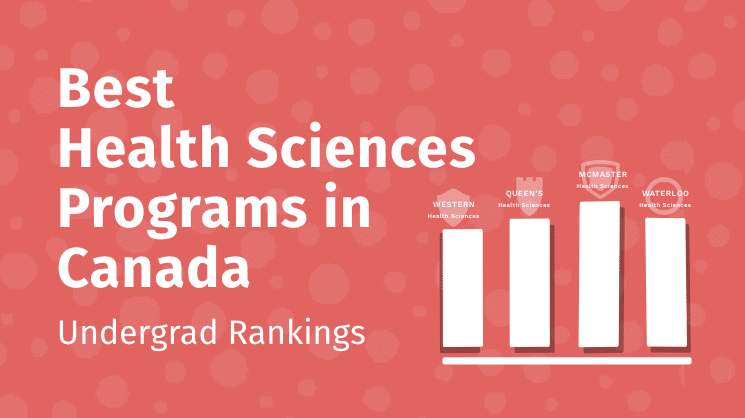
Rankings & Lists
Best Health Sciences Programs in Canada 2024 (Undergraduate)
You’re investing a TON of time, money, and energy towards your future. You’ve gotten the grades, done a bunch of… Read more
Queen’s Health Sciences – Ranking
The Faculty of Health Sciences at Queen’s University is recognized as a national leader in health education.
While the BHSc program is relatively new, it has gained popularity and recognition over the last few years.
Part of this has to do with the fact that Queen’s BHSc is the only Canadian program to offer a fully online BHSc degree at a top-tier university, as well as options to combine on-campus with online learning.
This flexibility, along with the innovative ‘flipped classroom’ style of learning and a high number of students being accepted to medical school after graduation, makes Queen’s one of the best programs for Health Sciences in Canada.
Queen’s Health Sciences – Tuition
The tuition for the Bachelor of Health Sciences is approximately $3,091.55 per term (or $6,183.55 total for both terms) for domestic students. This includes Student Activity Fees (SAF).
Every student must also pay Ancillary Fees (due in the Fall term only) of $1,214.66.
The total tuition and fees for the academic year is approximately $7,397.76.
International students must pay $12,935.00 per term, plus $1,214.66 in Ancillary Fees and $756.00 for UHIP fees. The total is $35,845.56.
Here’s a quick summary:
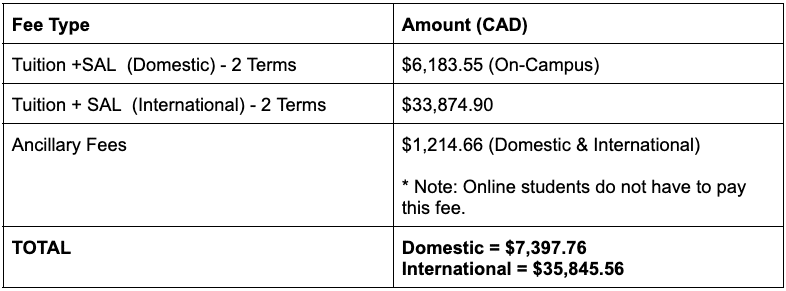
REMEMBER: This amount does NOT include other costs such as residence, meal plans, transportation, entertainment, etc. You should expect to add around $8,000-$10,000 per year on top of the total above for these additional costs.
For more information on tuition and fees at Queen’s University, visit this page.
You Might Also Like
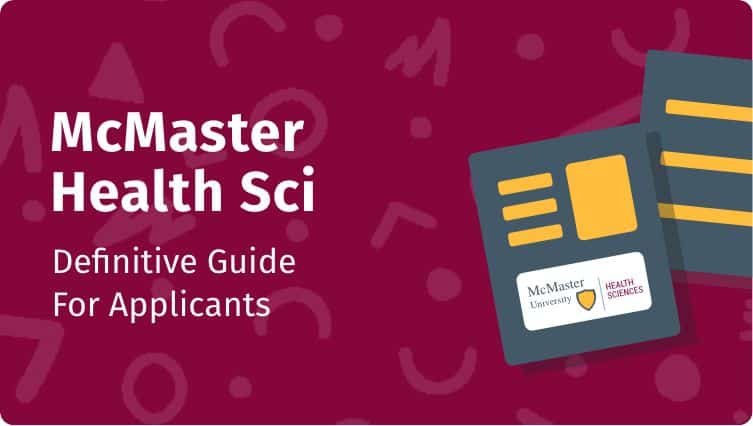
Program Guide
McMaster Health Sciences (BHSc): The Definitive Guide for Applicants (2024)
If you’re applying to McMaster Health Sciences (BHSc), or you’re simply interested in learning more about the program, this guide… Read more
Queen’s Health Sciences – Scholarships and Awards
Even though the tuition and fees listed above might seem overwhelming, Queen’s University has many opportunities for its students to win major admission awards, other admission awards, and admission bursaries to help you with these high costs.
For some of these, you’ll automatically be considered for when you apply. For others, you’ll need to submit a separate application.
For a full list of scholarships available at Queen’s, visit this page, and check out these other financial aid options.
Did you know that we’ve helped our students win more than $5 million in scholarships?! Connect with a coach to get the full list of scholarships for Queen’s BHSc and learn how you can get some of this cash for yourself. 🙂
Queen’s Health Sciences – Clubs & Student Life
Queen’s University feels like a big university, but you also get that feeling of a close knit community.
Located in the heart of Kingston, Ontario, there are a ton of activities to do on campus, like sports events, extracurricular activities, networking events, and more. There are also many things to do outside of the university, like festivals, concerts, fun restaurants, nightlife, and more. Needless to say, there will never be a dull moment if you’re looking for something to do when you’re taking a break from your course work.
If you’re looking for opportunities to make friends and get involved on campus, there are dozens of clubs and societies to choose from (check out this Clubs Directory). As you can see by looking at that directory, there’s something for everyone, no matter what your interests are.
Click here to learn more about what it’s like to be a BHSc student at Queen’s University.
Queen’s Health Sciences – Internships & Work Opportunities
All Queen’s BHSc students (on-campus and online) are eligible to do an internship and gain valuable work experience in the 2nd or 3rd years.
These 12 to 16 month work terms are done through the Queen’s Undergraduate Internship Program (QUIP) and are for domestic and international students.
All positions are paid and related to your particular interests and career goals.
Internships are a great opportunity to put what you’ve learned into practice while gaining valuable work experience and a network of industry professionals.
They will also give you the chance to build key skills that will help you in the workplace, like time management, organization, and communication as you research and interview for positions you’re interested in and then get hired for your work terms.
Internships can be a game changer for helping you get your foot in the door when you graduate (and making some extra money while you do!).
Once you complete the internship, you’ll get a ‘Professional Internship’ designation on your transcript.
To learn more about Undergraduate Internships at Queen’s Health Sciences, visit this page.
Queen’s Health Sciences – Study Abroad Program
Queen’s Faculty of Health Sciences gives students a unique opportunity to travel to the Bader International Study Centre (BISC) at Herstmonceux Castle in England for the first year of the BHSc program. Once this program is done, students return to Kingston in Year 2 of the program.
DID YOU KNOW?: For the first time ever starting in the Fall 2022 semester, upper-year Health Sciences students can take their 3rd year Fall term classes abroad at the BISC! In addition to coursework, students will do a community-based practicum with a local or international community health organization and connect with professionals from around the world. Learn more here.
Like the Kingston campus, the classes at BISC classes follow the same blended learning style (i.e. flipped classroom model). There are even smaller class sizes which allow for more collaboration, discussions, and 1-on-1 interactions with instructors.
You’ll also have the chance to visit the historic operating theatre in London and the Pasteur Institute in Paris — this truly is a unique experiential learning opportunity where you can see your studies in action.
If you’re interested in this opportunity, you must indicate your interest on OUAC, using the code QIH. If you want to be considered for admission to the BHSc program in Kingston AND England, you must submit 2 applications.
For more information about this unique study abroad program, visit this page.
DON’T MISS our Day in the Life video, where Youthfully Insider, HanShu, tells us all about her experience in the Queen’s BHSc program at the Bader International Study Centre.
Queen’s Faculty of Health Sciences – Contacts
The Faculty and Staff at Queen’s Health Sciences are always there to help whenever you need it.
Here’s the contact information if you need to get in touch with someone:
Address: Botterell Hall, Room 815, Queen’s University, 18 Stuart Street, Kingston ON K7L 2V5
Phone: 613-533-2566
Email: bhsc@queensu.ca
Queen’s Health Sciences – Graduate Studies
Queen’s Faculty of Health Sciences offers 17 graduate programs in their 3 schools to students who wish to continue their education after they complete the BHSc program.
There are also opportunities for interdisciplinary and cross-faculty programs.
Here is a list of the programs available:
- Aging and Health – G.Dip, M.Sc., PhD
- Biomedical and Molecular Sciences – M.Sc., PhD
- Biomedical and Molecular Sciences – Anatomical Sciences (Pattern II) – M.Sc. Anatomical Sciences
- Biostatistics (Collaborative) – PhD and MSc (Specializing in Biostatistics)
- Cancer Research (Collaborative) – M.Sc., PhD (Specializing in Cancer Research)
- Combined Medicine with Graduate Research – M.D./PhD, M.D./Master’s
- Epidemiology – PhD and MSc
- Health Quality Programs (Online) – M.Sc. (HQ), PhD (HQ)
- Health Professions Education – M.
- Medical Sciences – G.Dip., M.M.Sc.
- Neuroscience – M.Sc., PhD
- Nursing – G.Dip, PHCNP Dip, MNSc, MN(PHCNP), PhD
- Occupational Therapy – MSc.OT
- Pathology and Molecular Medicine – M.Sc., PhD
- Pharmaceutical and Healthcare Management Innovation – G.Dip PHMI
- Physical Therapy – M.Sc.PT
- Public Health – MPH
- Rehabilitation and Health Leadership – D.Sc.
- Rehabilitation Science – M.Sc., PhD
- Translational Medicine – M.Sc., PhD
For more information on the graduate opportunities at Queen’s Health Sciences, visit this page.
Queen’s Health Sciences – Day in the Life
If you want to learn more about what it’s like to be a student at Queen’s Health Sciences, watch this video by one of our Youthfully Insiders:
Common Questions From Students About Queens Health Sciences (BHSc)
How hard is it to get into Queens Health Science?
Queen’s Health Sciences is a competitive program and can be really tough to get into, especially when you’re competing against so many accomplished applicants.
ICYMI from our discussion above, the acceptance rate shows the competitiveness of this program. In 2019 and 2020, the Queen’s Health Sciences acceptance rate was approximately 4.25%, in 2021 it was around 3.04%. We’re also projecting that the acceptance rate for the 2022-2023 academic year will be around 4.29%.
Although applicants must have a minimum cumulative average of 75% (including the prerequisite courses) to be considered for admission to the program, an average in the low to mid 90s is considered competitive.
And this acceptance rate, combined with the fact that thousands of people apply to this program every year, means that it will be a bit harder to get in (but still just as competitive as other Health Sciences programs like McMaster BHSc).
A way that you can make your application more competitive is by communicating your experiences, interests, skills, and goals in a compelling and memorable way on your Supplementary Essays. This will help you improve your chances of admission, even if your average is a little bit lower.
To learn how to write Supplementary Essays that get noticed, read our Queen’s Health Sciences App Prep Guide and connect with a coach for support.
Is Queen’s Health Sci hard?
While there’s no clear answer whether Queen’s Health Sciences is hard, some students find the ‘flipped classroom’ style of learning we talked about above a bit challenging (i.e. when you do online modules BEFORE the class starts and then work with a small group and review the information and apply what you’ve learned).
With this type of learning, you have to have excellent time management, otherwise the online modules will add up (and if you don’t do them before class it will be really obvious to everyone). You have to have the discipline to work independently and hold yourself accountable if you want to be successful in this program.
Even though the course material can be challenging, this style of learning is really helpful if you need to spend extra time with the course material (you can do each online module as many times as you want). The class discussions are also a great way to review the material and ask any questions about things you don’t understand.
Like everything else, you’ll get out of the program exactly what you put into it. If you stay on top of the online modules, review the material, and attend your classes, you’ll get the hang of things and the program won’t seem so hard after a while.
What’s the difference between Health Sciences and Life Sciences? Which one should I choose?
There is a lot of overlap between these two programs, the only difference is what you want to focus more on.
Health Sciences focuses on HUMAN health and disease and makes an effort to teach students about societal and global influences of health. You also have the opportunity to take a lot of electives in other programs other than Health Sciences.
Life Sciences focuses on ALL living things and is more specifically focused on biomedical sciences. If you want to explore all areas of science, Life Sciences would be a good choice.
Both programs (as well as the Health Studies program at Queen’s) offer experiential learning opportunities that use interdisciplinary approaches and research opportunities.
If you need some help deciding which program is the best for you, connect with a coach for support.
How does Queen’s Health Sci get students ready for Med School?
Queen’s Health Sciences has a growing reputation of getting its BHSc students into med school.
As mentioned above, one of the ways this program differentiates its students is through the Competencies Framework, where students build skills (or ‘competencies’) that will help them get into and succeed in med school and eventually become effective healthcare providers.
These competencies/skills are:
- Collaborator: Physicians work effectively with other health care professionals to provide safe, high-quality, patient-centered care.
- Communicator: Physicians form relationships with patients and their families that facilitate the gathering and sharing of essential information for effective health care.
- Health Advocate: Contribute their expertise and influence as they work with communities or patient populations to improve health.
- Leader: Engage with others to contribute to a vision of a high-quality health care system and take responsibility for the delivery of excellent patient care through their activities as clinicians, administrators, scholars, or teachers.
- Scholar: Demonstrate a lifelong commitment to excellence in practice through continuous learning and by teaching others, evaluating evidence, and contributing to scholarship.
- Professional: Committed to the health and well-being of individual patients and society through ethical practice, high personal standards of behaviour, accountability to the profession and society, physician-led regulation, and maintenance of personal health.
- Content Expert: Interprets and connects health sciences information, developing a depth and breadth of knowledge of the health sciences.
Once they get into professional programs like med school, they already have a good understanding of these skills (vs. having to learn them when they get there). This makes Queen’s students more competitive, and increases their chances of getting accepted to their top-choice schools after completing the BHSc.
What are the classes at Queen’s Health Sci like?
Classes at Queen’s Health Sciences are a bit different from other schools, which uses the lecture-style approach where a professor teaches and students take notes and are tested later.
As mentioned above, Queen’s BHSc students do online modules and assessments for that module before class, and then they discuss the course material with a small group in class.
This is a HUGE advantage of the program because the course material in this program is often a bit difficult to understand, especially when you’re coming out of high school and experiencing university for the first time. Reviewing the online modules and then discussing the material in class allows you to ask questions if you don’t understand something, and it really helps you retain the information since you aren’t hearing it for the first time in class (every class is a review session of the coursework!).
The classes are also pretty small (around 20 students or less), which allows for a more hands-on, collaborative class environment. Queen’s also has some good opportunities for experiential learning, like by visiting the Queen’s University Anatomy Learning Centre for the Anatomy of the Human Body class and studying specimens, bones, and anatomical models.
In addition to the course material and learning about all areas of Health Sciences, you will be required to understand and develop the core competency skills in Queen’s Competency Framework. This includes building skills like collaboration, communication, and leadership. Some students can find this a bit difficult. But trust us, it will pay off in the end, especially if you’re applying to med school or other professional schools.
Want to see what a course is like at Queen’s BHSc? Try this course demo.
Queens Health Sci vs. Other Programs
Queen’s BHSc vs. McMaster BHSc
Queen’s Health Sciences and McMaster Health Sciences are both top-ranked programs, and there are a few similarities and differences between each.
McMaster and Queen’s also have similar acceptance rates (McMaster at 5% and Queen’s at 3-4.25%), and a competitive admission average is the same for both schools (in the low to mid 90s).
Over 60% of McMaster BHSc graduates go on to medical school, which is a big reason why McMaster’s program is so popular. Queen’s Health Sciences also has a really good record for its students getting into medical school, especially because of its Competencies Framework approach.
The tuition for both programs is pretty close too (Queen’s Health Sciences tuition is approximately $6,183.55 plus fees and McMaster’s tuition is around $6,042 plus fees).
Unlike McMaster BHSc, Queen’s doesn’t use the inquiry-based model of learning, where students think about questions and come up with compelling answers. Instead, Queen’s has its own innovative approach to learning with their flipped classroom, where students do online modules and mini-assessments before class instead of after.
Both programs have small class sizes, which allows for collaboration, problem solving, and critical thinking (vs. simply listening to a lecture in a room with hundreds of other students). You will get a comprehensive and foundational education of health and healthcare from both programs.
To learn more about McMaster Health Sciences (BHSc), read our McMaster BHSc Program Guide.
You’ve Got a Dedicated Coach in Your Corner
For over a decade, we have worked with thousands of students to help them achieve more than they ever thought possible.
Our coaches have a strong success rate supporting students as they apply to Queen’s Health Sci, among other top university programs.
Our 1-on-1 Youth Coaching fills that gap that most high schools miss. We can help you build self-awareness through probing questions and assessments, set bigger goals to elevate your extracurriculars and future career plans, and improve skills that matter on supplementary applications, such as interviewing, written communication, critical thinking, and creativity.
We use a coaching methodology, called ‘full student’ development, that’s been proven to increase your chances of admission to top-tier universities and obtaining competitive jobs/internships.
So, what are you waiting for? Fulfill your post-secondary potential with the mentorship and coaching you’ve always wanted! 🙂
IMPORTANT: Want to share information and/or images from this resource on your own website, blog, article, etc.? Please ensure you reference content of any kind published by Youthfully Inc., in whole or in part, using the following statement: (1) Our Organization (Youthfully Inc.); (2) The title of our content/resource; and (3) the URL to our webpage where the content was originally posted. For example: “Sourced from: Youthfully Inc., ‘Queen’s Health Sciences: The Definitive Guide for Applicants (2024)”, https://youthfully.com/queens-health-sciences-definitive-guide.” Not doing so is an infringement of copyright and is illegal. We spend significant time developing resources for students, so please take a few seconds to ensure they are referenced properly.
DISCLAIMER: While the information in this blog is considered to be true and correct at the date of publication, and although our team makes every attempt to ensure that the information is accurate and vetted by university staff, Youthfully is not in any way liable for the accuracy of any information printed and stored or in any way interpreted and used by a user.
Supplementary Essay
About the Program
Common Questions
Queen's BHSc vs. Others
Get 1-on-1 Support

